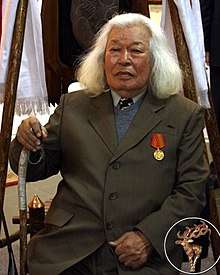Mongush Kenin-Lopsan
Mongush Borakhovitch Kenin-Lopsan (in Russian Монгуш Борахович Кенин-Лопсан, scientific transliteration Monguš Borakhovič Kenin-Lopsan) born April 10, 1925 at Chash-Tal, Tuva, Chöön-Khemtchik district out of family of Bora-Khöö. Kenin-Lopsan is a writer, poet, historian, archaeologist and famous Tuvan shamanism researcher and lider living in Kyzyl,[1] the capital of Tuva, Russian Federation.

His grandparents/parents were nomads, cattle breeders, herders, blacksmiths as well as storytellers and shamans. Kenin-Lopsan was educated at ground school in Chadan, later on colleges in Kyzyl. He studied philology at Leningrad (today St. Petersburg) University and received a Master's degree in 'Eastern Sciences'. Being back in Tuva he served as a teacher of Tuvinian as well as of Russian language and literature and as an editor for a publishing company in Tuva.
Among his first books was The Big Way (1956) as well as other novels like The Currents of the Big River (1965), Dance of Capricorn and The Yurt of the Horse Herder. He won several Russian and Tuvan prizes. His whole life he collected stories from his kinsmen, storytellers, shamans, workers, herders and poets. For his research on shamanism he was persecuted during Sovjet times; his grandmother shamaness Kuular Khandyshap died after being imprisoned in a Gulag for 15 years.
Publications
- Algyshi Tuvinskich Shamanov (Songs of Tuvan Shamans), Novosti, Kyzyl 1995. - Schamanengesänge aus Tuva (translation into German), Lamuv, Göttingen 2013.
- Mifi Tuvinskich Shamanov (Stories of Tuvan Shamans), Novosti, Kyzyl 2002. - Calling the Bear Spirit (translation into English), Kjellin, Kristianstad 2010. - Schamanengeschichten aus Tuwa (Translation into German), Lamuv, Göttingen 2011.
- Hoppál, Mihaly (ed.): Shamanic Songs and Myths of Tuva (selected stories and songs out of "Algyshi" and "Mifi", English), Istor Books #7, Budapest 1997.
References
- Balzer, Marjorie M. (1995). Culture incarnate: native anthropology from Russia. M.E. Sharpe. pp. 15–. ISBN 9781563245350. Retrieved 1 April 2013.